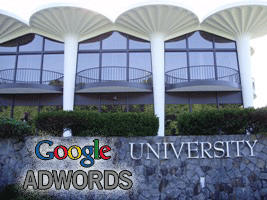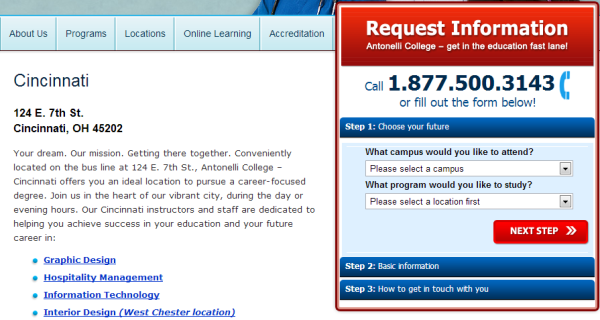Universities are always looking for an edge when it comes to recruiting. The more applications a college receives, the more selective they can be about bringing in the brightest students, thus improving upon key metrics universities hold so dear to attract the next generation of students. Metrics such as graduation rate, salaries upon graduation, and ROI. Below are 8 strategies to help improve upon an integral part of every university’s marketing budget: digital advertising spending using Google Adwords.

1. Build Dedicated Landing Pages
Every campaign should have a unique, visually appealing landing page that offers a quick overview of the university. Depending on your objectives, you’ll want that landing page to have some sort of Call-to-Action (CTA) to help reduce your bounce rate and increase both time spent on your pages as well as conversion rates. Some great CTAs include encouraging a follow on Twitter, signing up for an e-mail newsletter (promise that the newsletter will have riveting content!), or chatting with a university representative. Antonelli College does a great job of this with a unique landing page for their Cincinnati Adwords campaigns:
2. Support your Claim
With a limited amount of real estate on your landing page and a brief window of opportunity to convince a visitor of your legitimacy, it’s important you focus on why prospective students should reach out to your admissions team. What makes your university/program superior, and why should they trust you? Often incorporating supporting material can help, such as:
- Benefit statement
- Student testimonials
- White paper, article, or eBook download
- Video
- Slideshare presentation
3. Long-Tail Keywords
Long-tail keywords are a highly specific type of keywords phrase which draws less but more qualified traffic. They help refine search terms with much less expensive Cost-per-click (CPC) bidding since there are less people attempting to place bids on those keywords. For example, “Universities in Ohio with an MBA program” will draw highly qualified traffic as opposed to short-tail keywords like “MBA program” or “Ohio Universities.”
4. Use Negative Keywords
To reiterate, keywords help control which searches can trigger your ad. Examples include broad match, broad match modifier, phrase match, and exact match. Examples and definitions of each can be found on this Google Adwords support page. The final type of keywords is perhaps the most important: negative keywords. Negative keywords help filter out keywords that bring unqualified traffic to your site. For example, if you want to bid on the search term “business programs in Cincinnati,” but notice you’re getting traffic from the search “business jobs in Cincinnati,” you can filter out the keyword “job.” Now you’ll only getting traffic from students and not job hunters.
5. Lather, Rinse & Repeat
Along the topic of keywords, it’s important to determine which keywords are bringing you the best traffic. Get rid of bad keyword matches or phrases (or add negative keywords to them), and keep an eye out for new keywords that may be beneficial. This should be done on a regular basis, often daily.

6. Measure Success with Google Analytics
Beyond simply generating qualified clicks, you’ll want to truly measure the return on your investment. The three main areas to measure in Google Adwords includes:
- Impressions
- Clicks
- Conversions
While the first two can be easily tacked in Google Adwords, the third, conversions, requires that you set up a goal in Google Analytics. The goal will essentially tell you that people are visiting your landing page. Great. But out of those people, only 3% filled out your form and got to a thank you page, which is how Google Analytics knows the goal has been met. Now you can begin optimizing your Adwords account and landing page to try and improve on that 3% conversion rate. If you’re not tracking conversions with Adwords, you’re essentially wasting your money and have no way to connect your ad spend to any form of return.
7. Account Management
Your adwords campaign must be ran by a dedicated and knowledgeable account manager, and should be checked on a very regular basis. Adwords accounts that go unmonitored for weeks or even months are guaranteed to spend money on unqualified traffic. As search patterns and Adwords features change, so should your campaigns – success one month does not guarantee the same success the next.
8. Organic Content
Paid search should not be your only means of drawing qualified traffic to your site. Your university’s website should be updated frequently and provide helpful resources for any visitor. SEO, blogging, and social media, the three key elements to inbound marketing, will drastically help improve your organic traffic if executed properly. Keep in mind most pople will click organic search results, not paid ads, so you’ll want to be sure you’re covering all your bases.
—–
InfoTrust has three Google Adwords Qualified Individuals, including myself. I’d love to hear your thoughts on this article using the comment section or emailing me at jimmy [at] infotrustllc.com


